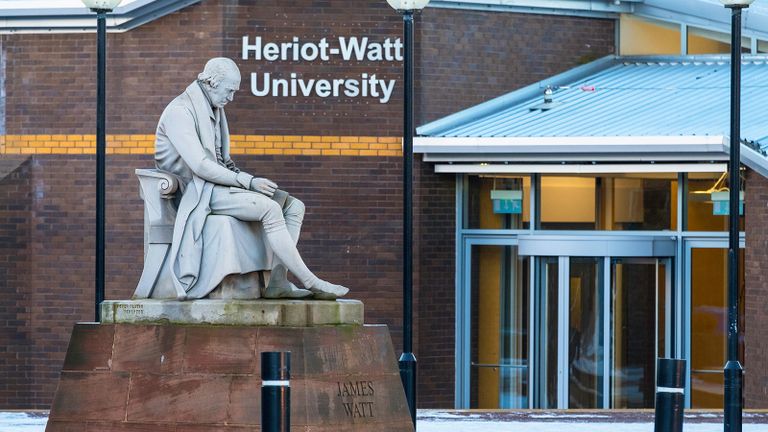Heriot-Watt University
National rank
57
th=
81.9
%
Firsts / 2:1s
86
%
Completion rate
Key stats
128
th
Teaching quality
116
th=
Student experience
44
th
Research quality
36
th=
Graduate prospects

Performance
| Category | Score | Rank |
|---|---|---|
| Ranking | - | 57= (30=) |
| Teaching quality | 66.5 | 128th |
| Student experience | 66.7 | 116th= |
| Research quality | 48.7 | 44th |
| Ucas entry points | 172 | 13th |
| Graduate prospects | 79.3 | 36th= |
| Firsts and 2:1s | 81.9 | 38th |
| Completion rate | 86 | 61st |
| Student-staff ratio | 18 | 95th= |
| World ranking | - | 281= (270=) |
Vital statistics
| Undergraduates |
Full-time 7,258 |
Part-time 390 |
| Postgraduates |
Full-time 2,389 |
Part-time 1,161 |
| Applications/places | 8,745/1,650 | |
| Applications/places ratio | 5.3:1 | |
| Overall offer rate | 84.3% |
Accommodation
| Places in accommodation | 1,823 | |
| Accommodation costs | £154 - £215 | |
| Accommodation contact | https://www.hw.ac.uk/uk/edinburgh/accommodation.htm |
Finance
| Scots/EU fees | £0 - £1,820 | |
| Fees (placement year) | £910 | |
| Fees (overseas year) | £910 | |
| Fees (international) | £16,000 - £20,584 | |
| Finance website | https://www.hw.ac.uk/study/fees-funding.htm | |
| Graduate salaries | £25,000 |
Sport
| Sport points/rank | 699.5, 48th | |
| Sport website | https://www.hw.ac.uk/uk/edinburgh/sports/sports-union.htm |
Social inclusion and student mix
| Social Inclusion Ranking | 10 | |
| State schools (non-grammar) admissions | 85.3% | |
| Grammar school admissions | 4.4% | |
| Independent school admissions | 10.3% | |
| Ethnic minority students (all) | 13.2% | |
| Black achievement gap | -18.5% | |
| First generation students | 33.1% | |
| Deprived areas | 13.4% | |
| Mature students | 23.4% | |
| EU students | 4.7% | |
| Other overseas students | 15.5% |
Student satisfaction with teaching quality
| Physics and astronomy | 76.4% | |
| Chemical engineering | 76.1% | |
| Aeronautical and manufacturing engineering | 75% | |
| Town and country planning and landscape | 73.7% | |
| Mathematics | 73.1% | |
| Economics | 72.3% | |
| Electrical and electronic engineering | 71.7% | |
| Biological sciences | 71% | |
| Civil engineering | 70.8% | |
| General engineering | 69.1% | |
| Chemistry | 68.7% | |
| Psychology | 68.1% | |
| Building | 67.8% | |
| Computer science | 66.8% | |
| Accounting and finance | 63.8% | |
| Mechanical engineering | 62.8% | |
| Business, management and marketing | 61.4% | |
| Art and design | 56.5% |